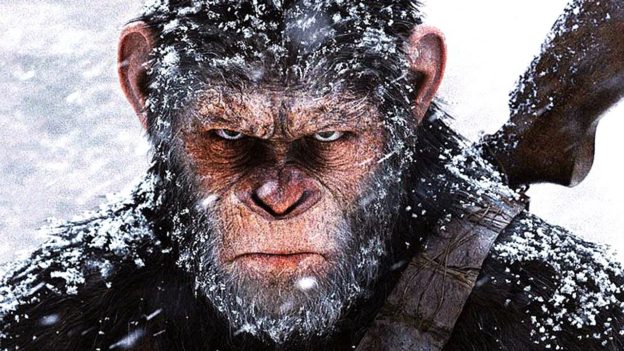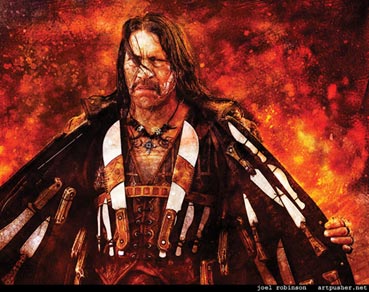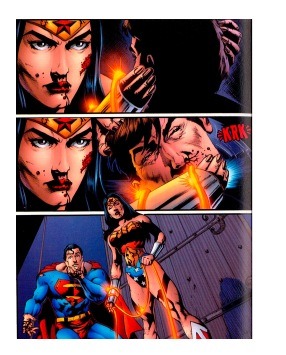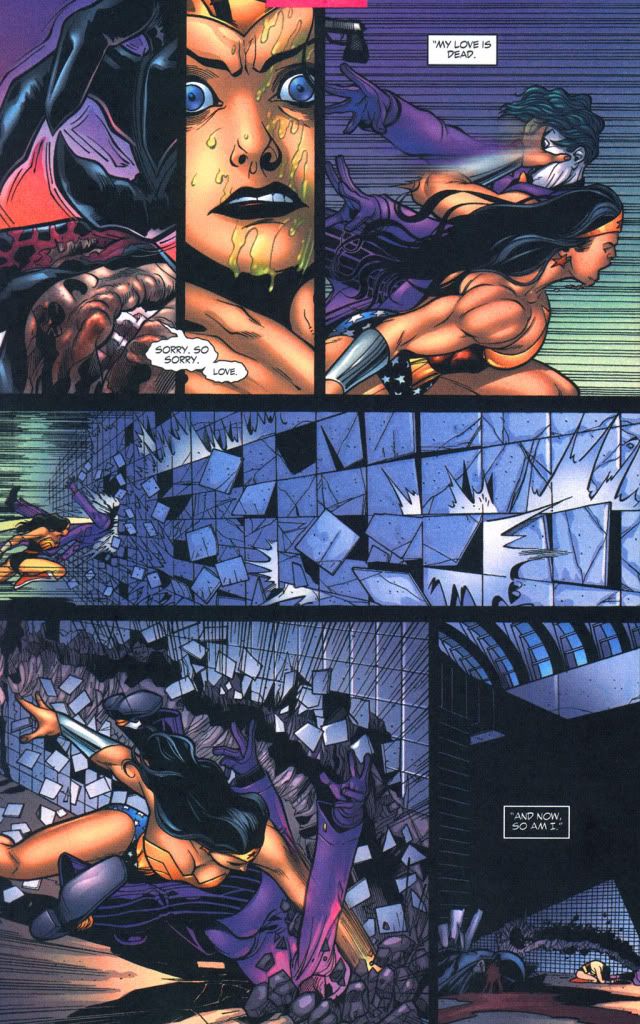Okay. So. Can we talk about something? There has been a Planet of the Apes trilogy running over the past six years, essentially a prequel to the original Charlton Heston film (though not canonical to the first prequels to the original, Conquest of and Battle for the Planet of the Apes), and what’s weird about it is that despite there being a full trilogy at this point, we don’t think about them when they’re not in theatres.
Let’s be clear. This is not me shouting from a street corner about how the Planet of the Apes franchise is great and only I seem to know it. I am like you. I forget about them as well. I have seen Rise of, Dawn of, and now War for the Planet of the Apes in theatres… I saw Dawn while on vacation in New York freaking City, when I could have been doing infinite other things, and had zero regrets… but unlike all of my other pop-culture interests, I give it no thought between movies. I don’t follow casting news… in fact, I probably heard that Woody Harrelson was in the new one more than once but kept forgetting. I don’t watch and rewatch trailers. Hell, I don’t think I’ve ever seen a trailer for War. I’ve seen each of them on the big screen, often opening weekend or close to, yet I’m always surprised when a new one shows up in theatres.
As, I imagine, are you.
And the reason, friends, the reason that this is weird? They’re so good, you guys. They are all so good.
The current Planet of the Apes franchise is consistently well-made, well-acted, and has potentially ended on a tense, powerful, emotional finale that challenges Wonder Woman and Baby Driver for best movie of the summer.
And maybe the reason that we keep glossing over it is that Tim Burton’s Planet of the Apes remake was so very, very bad. It was, we can admit that, it was. I saw that one in theatres as well, also on opening weekend, but thankfully at a time when I didn’t need to pay for movies. Because that film had flaws, yo. But no Planet of the Apes film should ever be judged on that Marky-Mark-starring incoherent train wreck. It stands alone and rightfully unloved. And since 2011’s Rise of the Planet of the Apes, this has become a franchise without a weak link.
So let’s talk about this weirdly forgotten but excellently made trilogy while I still remember it exists and doesn’t have musical numbers.
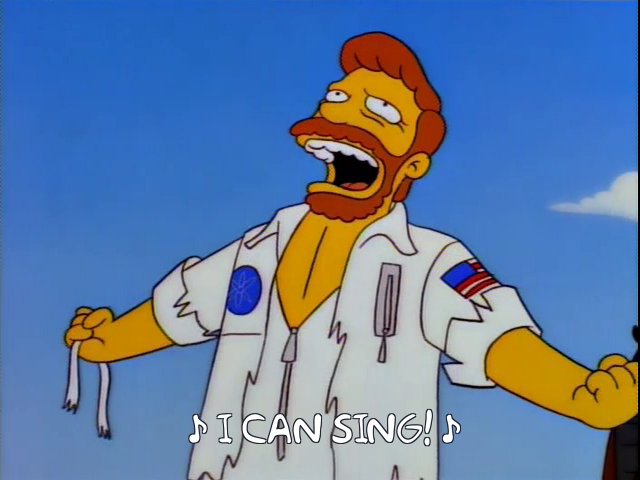
But first, an acknowledgement
Brianna Wu, frequent target of internet misogynists who prove that man is, indeed, the real monster, raised an issue about the most recent entry… the female roles aren’t the best. Her assertion is that no female character, human or ape, has a spoken line in the movie. I would counter that three female characters, human and ape, have dialogue delivered via sign language, and shouldn’t that count, but… let’s not get into a debate over what is or isn’t ableism. That is not my purview.
Also, it’s not important whether the exact facts involved in her complaint are correct, the important thing is that she’s not wrong about this franchise lacking when it comes to writing for women. Rise to War, it is a male-driven franchise. I’m sure the first two movies had female characters, save for Cornelia the ape (looking up her name tells me that Keri Russell was in Dawn, which you’d think I’d remember), but I couldn’t tell you anything about them. That’s… that’s a problem. That’s an authentic problem.
So let’s just go ahead and put “Roles for women and POC” on Wonder Woman’s scorecard for “Best movie of the summer,” much as we’ll be giving “Well written villain” to War for the Planet of the Apes. Or Spider-Man: Homecoming. Or Baby Driver. LET’S…
Let’s just focus on the apes from here. They’re not great at writing for women, that’s unfortunate, but let’s move on.
Rise of the Planet of the Apes
Spoilers ahead. And throughout. If you want to watch the whole trilogy unspoiled, oh my God go do that right now. Stop reading this and watch these movies. Otherwise… allons-y.
Rise of the Planet of the Apes came out a full decade after Tim Burton made the concept look worse than 1960s production values ever, ever could. Some brave soul thought that enough time had passed that people were ready to revisit this brand, and developed an all-new prequel to the 1968 original film. So I guess it’s kind of a reboot, since Conquest of and Battle for the Planet of the Apes already did the prequel stuff back in the 70s, but there’s still at least one Easter egg setting up the original movie.
James Franco (James freaking Franco used to be in this series, that seems incredibly weird six years and two films later) plays Will Rodman, a biologist trying to find a cure for neuro-degenerative issues like Alzheimer’s, which his father suffers from. His father being played by John Lithgow (John freaking– no, no, that dude has range, he can be in whatever he likes). So eager is Rodman to find this cure that he does his own off-the-books testing with a baby chimpanzee he names Caesar (mo-cap superstar Andy Serkis), and ultimately his own father. This causes some issues.
First, Caesar attacks Will’s asshole neighbour when he gets hostile with Will’s father, and is taken to, basically, a dog pound for apes. Here Caesar meets a fellow chimp named Rocket and an orangutan named Maurice who, like Caesar, speaks sign language. Rocket (Terry Notary) and Maurice (Karin Konoval) will be two of Caesar’s closest friends and acolytes for the rest of the trilogy, and these three will be the only people to appear in all three movies. Notable amongst the staff of the… I hesitate to use the word “sanctuary,” because these people are terrible… is Harry Potter/Flash star Tom Felton, who is given two of Charlton Heston’s iconic lines from the original movie.
Second… Will’s serum has some unfortunate side effects. Viral in nature, it makes apes super-smart, but is lethal to humans. And spreads really easily. Soon Caesar has enhanced an army of apes, and is charging the Golden Gate Bridge. But not to conquer anything. Just to take his much-abused ape brethren, be they chimp, orangutan, or gorilla, away from humankind to somewhere they can live in peace.
Not that that will be an option.
Also, Will’s asshole neighbour is an airline pilot. So, while infected with this lethal virus, he heads to work at the San Francisco international airport, allowing said lethal virus to go everywhere.
And thus the fall of humankind begins.
This movie is great. It was great. I remember thinking that. And the most important non-ape character (obviously the most important character is Caesar, being the lead of the entire trilogy) might be Tom Felton. The ape pound provides our best look at what will be the central theme of the entire trilogy… hatred and fear of The Other drives us towards war and away from peace and progress. In this case, mistreatment of apes pushes them, once gifted with higher intelligence, towards banding together and leaving the world of humans.
Maurice, by the way, is named after the actor who played orangutan scientist Dr. Zaius in the original movie.
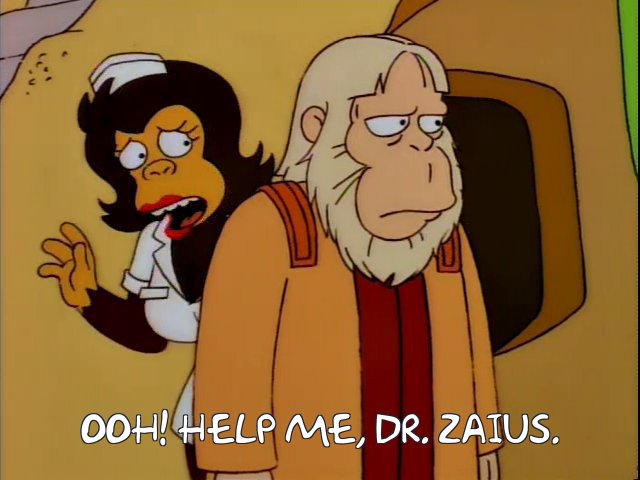
Dawn of the Planet of the Apes
This was the hardest one to motivate myself to see. But not so hard that when my parents said to me, on our trip to New York, “Want to see a movie…”
Yes, my parents took me to New York in July of 2014. Just because my travel agent friend had a deal. It was awesome. My parents are pretty great. That is not our topic.
Anyway, my parents suggested a movie, this being a night when we hadn’t pre-booked a show (and maybe it was Monday, and nothing was on? I’m honestly not sure), and down the street from our hotel was a theatre that had re-dedicated itself to being as fancy as possible, so I said “Sure. The theatre down the street is showing the new Planet of the Apes, may as well see that.”
One of the consistently best-made summer movie franchises and I see them largely by accident. This is the whole “nobody thinks about them” thing.
I hadn’t been excited for this one because of the basic plot. The survivors of the “simian flu,” aka that lethal side effect I mentioned from last time, are attempting to rebuild society in the ruins of San Francisco, near Caesar’s ape village. A human named Malcolm (Jason Clarke, who you’d probably recognise from something but never bothered to learn his name) reaches out to Caesar, hoping to build a peace between human and ape. Caesar is down with this, having been raised by a human (who died between films, probably from the simian flu). But there’s a problem. The head of Malcolm’s group, played by Gary Oldman, does not trust these apes at all. And one of Caesar’s top lieutenants, Koba (Toby Kebbell), is a former lab animal who cannot let go of his hatred for humans.
Sidebar… between Caesar, Rocket, and Koba, there were now three past and future King Kongs in the franchise. That doesn’t really mean anything, save that Serkis, Notary, and Kebbell are good at motion capture, but I thought it worth noting.
So anyway, that’s the central conflict. Caesar, Jason Clarke, and Keri Russell think peace between man and ape is possible, but Gary Oldman doesn’t buy it, and Koba is actively trying to start a war.
My one complaint, my only complaint, is that, well, it’s not called Dawn of the Planet of Apes and Humans Who All Get Along and Everything is Fine, so… it’s kind of a foregone conclusion.
Which, depending on your perspective, might only help the movie. It’s an epic tragedy, like the better Godfather movies or The Empire Strikes Back or Batman: Mask of the Phantasm, which is still one of the best Batman movies. Fight me.
So I didn’t rush to watch it, and it had this thing weighing it down, but it’s excellent, really it is, and it’s vital to understanding what comes next.
And we reach the War
Seeing this was somehow even more accidental than the last one. I only saw this one on opening day because I misremembered a start time and we were 20 minutes late to The Big Sick. But it worked out.
It’s now 15 years after Rise of the Planet of the Apes, according to the opening text bursts. The opening text also serves as a valuable tool for those who didn’t see or just forgot about the last two movies, because they summarise the events and highlight the words “Rise” and “Dawn” so there’s no confusion.
In War For the Planet of the Apes, Koba’s choices still loom large. Humans and apes have been at war since Koba started a larger fight. Caesar still pushes for peace, but the nearby human military, led by Woody Harrelson’s unnamed Colonel, are not having it.
Matt Reeves, writer/director of both Dawn and War, indicated that The Colonel also killed Jason Clarke and Keri Russell’s characters from Dawn, but had to cut the dialogue that revealed that. Not surprising, since the movie’s already over two hours, and that dialogue is not strictly necessary.
Matt Reeves and Woody Harrelson steer hard into the comparison between the Colonel and Colonel Kurtz from Apocalypse Now. The apes discovering graffiti reading “Ape-pocalypse Now” is actually one of the more subtle allusions.
The Colonel is definitely and unquestionably the Bad Guy. He’s cruel and and merciful, displayed by how he treats both ape-kind and humans he finds lacking.
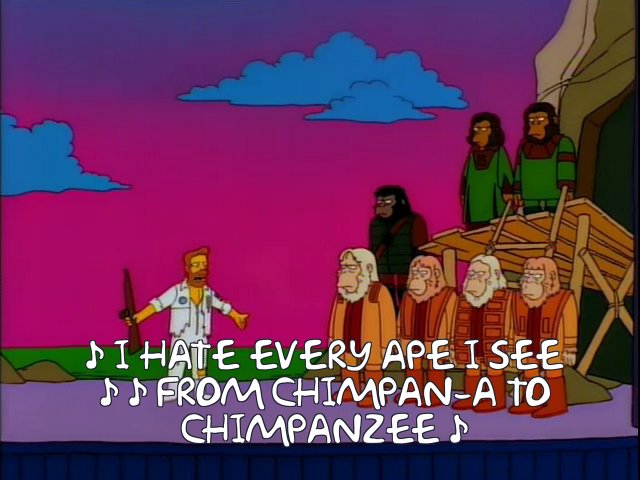
However, all of his many, MANY misdeeds come from one easy to understand source. He sees where all of this has been going: apes replacing humans as the dominant species. His fear of this eventuality pushes him into truly dark actions, including an attack on Caesar’s ape hideout that leaves some of Caesar’s own family dead. Caesar is then determined to bring down the Colonel in return.
Caesar: Hate. The Colonel: Fear. Thus are our two main themes represented. Maurice even points out that Caesar’s hatred is making him more like Koba, whose hatred of humans caused all of this, and who continues to haunt Caesar through dreams and hallucinations.
Worse than that, several of Koba’s acolytes now work for The Colonel. They’re known as “Donkeys,” for two reasons: 1) they’re basically treated as pack animals, and 2) as the Vietnamese were known as “Charlie” and the Germans were known as “Fritz,” the apes are referred to as “Kongs.” Thus the traitor apes are “Donkey Kongs.” I dig that.
This movie is so good. Aside from another excellent exploration about how hate and fear are destructive to any attempt at civilisation, and how tribalism drives cruelty, Reeves knocks this one out of the park. Serkis is as good or better in this movie as he was as Gollum in Lord of the Rings. Steve Zahn is great as Bad Ape, an unexpected ally they pick up along the way. Karin Konoval’s thoughtful, philosophical, empathetic Maurice has been and remains a series highlight. Newcomer Amiah Miller acquits herself well as Nova, a young human girl who helps bridge this movie and the world of 1968’s Planet of the Apes in a way I’m choosing not to spoil. And Woody Harrelson? He is amazing. He gives Michael Keaton’s Vulture from Spider-Man: Homecoming a run for his money as the summer’s best villain.
Sorry, Wonder Woman and Baby Driver, you are fighting for third and that’s just how its is.
And the effects. God, the effects. If I didn’t know that the apes are done through motion capture, I would assume that the mask work on this movie was bleeding edge. In other words, the CG on the ape performances is so convincing that if you told me that they actually bred apes who could act this well, I wouldn’t be 100% sure you were wrong.
What I’m saying is that the ape characters look incredibly realistic. More than the last two, the apes carry this movie, and they do not look like CG apes at all. Which means that the performances of the humans behind the apes are able to absolutely crush it, and the CG never once took me out of the moment. Scenes involving Caesar and Maurice were absolutely heartbreaking.
War For the Planet of the Apes moved me in a way that only two movies in the last year have. And not any of the best picture nominees: just Wonder Woman and Rogue One.
A thing I haven’t gotten around to mentioning yet. The latter-day Planet of the Apes trilogy are not action movies. If memory serves, the trailers lean on what action there is. (I say “If memory serves” because I don’t think I’ve watched a trailer for any of them since 2014.) But they aren’t, on the whole, driven by action. All three have a very well-done action set piece in the climax, but the meat of the film is in the drama, not the fighting.
In terms of sheer fun, maybe Spider-Man: Homecoming and Wonder Woman edge out War For the Planet of the Apes, because it is a kind of grim story. I mean, again, the title kind of implies that humans are not going to do well, although this time we are just straight up the villains, so sure, fine. Also, the recurring theme that fear and hate hold us back does not present an easy solution. These movies basically say “fear and hate will screw us over, and there’s nothing we can really do about that as long as the fearful and the haters are in charge.”
But maybe if we all really try, we can move past fear and hate. Maybe we can embrace hope for a better future, and the will to see it through. And if the Green Lantern comics teach us anything, it’s that will backed by hope is unstoppable.
Yes, I went nerdy there. I’m not sorry.
Long story short. Watch War For the Planet of the Apes. And if you haven’t seen the others, track down Rise of the Planet of the Apes and work your way forward. This franchise is too good to be overlooked.
And now my declaration of that fact will live on, even when I forget how good these movies are and assume that only Wonder Woman, Spider-Man, and Edgar Wright knocked it out of the park this summer.
Oh, shoot, I forgot about Dunkirk and Valerian. Man, it’s almost enough to make you miss last summer, when you could take all of June off from the movies and miss nothing.

